Việt Nam People's Army turns 80: Building a strong,soi kèo mu vs bayern modern military
December 21, 2024 - 08:07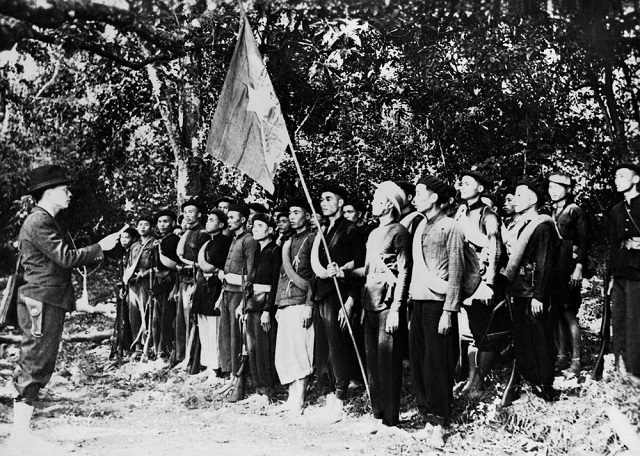 |
| General Võ Nguyên Giáp and the first members of the Việt Nam Propaganda Unit of Liberation Army, forerunner of the Việt Nam People's Army in their birthplace forest on December 22, 1944. — VNA/VNS File Photo |
On the occasion of the 80th anniversary of the establishment of the VPA (December 22, 1944),and the 35th anniversary of the All-People National Defence Day (December 22, 1989), General Phan Văn Giang, Politburo member, and Minister of National Defence, penned the article entitled Promoting the heroic tradition and glorious cause, building a strong Việt Nam People’s Army to protect the Socialist Republic of Việt Nam
*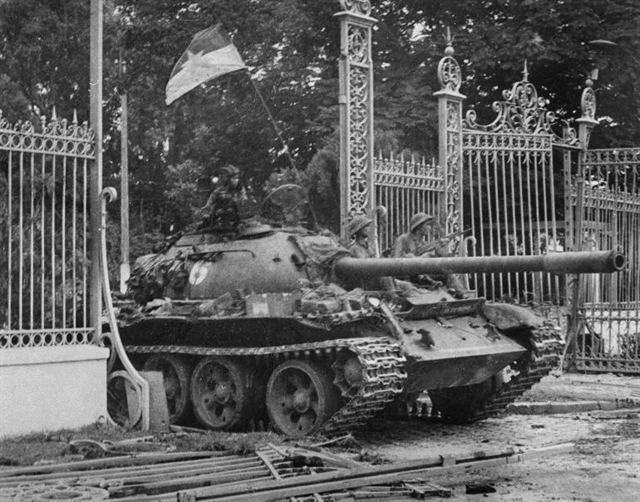 |
| At 11:30am. on April 30, 1975, the liberation forces overruns the Presidential Palace, the headquarters of the Sài Gòn regime, to win the final victory to reunify the country after two decades of division. — VNA/VNS File Photo Trần Mai Hưởng |
Eighty years ago, under the directive of President Hồ Chí Minh, the Việt Nam Propaganda and Liberation Army Team—predecessor of the Việt Nam People’s Army—was established on December 22, 1944.
This marked a pivotal development in the armed revolutionary struggle under the Communist Party of Việt Nam's leadership. For the first time in history, the Vietnamese working class and people had a new style organised army, led, educated and trained by the Party and President Hồ.
Born amidst the difficulties of the Vietnamese revolution, the army grew under the absolute, comprehensive leadership of the Party, the support of the populace, and international friends. Over the past 80 years, it has developed and achieved brilliant victories, enriching the heroic and indomitable traditions of the nation, and fulfilling President Hồ’s praise: “Our army is loyal to the Party, devoted to the people, ready to fight and sacrifice for the independence and freedom of the Motherland and socialism. No task is too difficult, no enemy is undefeatable.”
From its humble beginnings of 34 personnel armed with rudimentary weapons, the VPA quickly won the battles of Phai Khắt and Nà Ngần, laying the foundation for its “invincible” tradition. Within less than a year, the VPA spearheaded the August 1945 Revolution, establishing the Democratic Republic of Việt Nam—the first people’s democratic state in Southeast Asia -- on September 2, 1945.
During the resistance wars against French colonialists and American imperialists, the VPA played a pivotal role alongside the people in achieving historic victories such as the Điện Biên Phủ Battle (1954), the “Điện Biên Phủ in the air” campaign (1972), and the 1975 Hồ Chí Minh Campaign, culminating in the liberation of South Việt Nam. These triumphs across the two resistance wars lasting three decades forced the world's leading colonialist and imperialist powers to withdraw from Việt Nam, reuniting the nation and heralding a new era of independence and socialism.
Following national reunification, the army continued its heroic role in defending the country during border conflicts and fulfilling international duties in Cambodia, and defending the northern borders of the country. It then led efforts to build a national defence system and addressed non-traditional security challenges such as natural disasters and epidemics and search and rescue operations.
The VPA has participated in national construction, thwarted 'peaceful revolution' attempts by hostile forces, engaged in international integration and defence diplomacy, especially peacekeeping efforts by the United Nations, thereby enhancing Việt Nam's global reputation while ensuring long-term peace and stability, key for national development.
Currently, the global and regional situation is undergoing major, unpredictable changes. Peace, cooperation and development remain dominant trends, but strategic competition, local conflicts, territorial disputes in many regions, as well as the emergence of new forms of warfare, methods, and tactics both in traditional and non-traditional fields, are threatening global peace, stability and security.
The Asia-Pacific region, including Southeast Asia, continues to enjoy dynamic development, but risks of instability remain, potentially leading to conflict. Domestically, the đổi mới(renewal) process has brought our country wealth, potential, and increasing international prestige, yet challenges persist, and new complex issues are emerging. Hostile forces, both domestic and foreign, continue to promote “peaceful evolution”, drive “self-evolution”, “self-transformation”, and “depoliticisation” of the military using increasingly sophisticated and insidious methods.
This situation demands that the entire military continue to uphold its heroic tradition and glorious achievements over the past 80 years, focusing on building a streamlined, strong, modern military capable of meeting national defence requirements in all situations, with many decisive, compatible solutions; in which it is essential to focus on a few key issues and solutions.
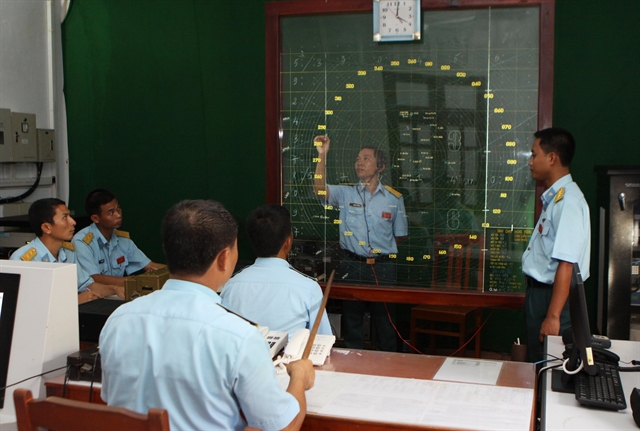 |
| Officers on duty at Radar Station 57 on Nam Yết Island, part of the Trường Sa (Spratly) archipelago of Việt Nam. — VNA/VNS Photo Dương Giang |
First, to remain steadfast and enhance the political strength of the military. This is a fundamental issue in building a revolutionary armed force for the Party and is a great lesson learned from the VPA's 80-year journey of building, fighting, overcoming challenges, and maturing.
Strengthening the military’s political foundation ensures the preservation and enhancement of the military’s working-class nature, the Vietnamese people's characteristics, and national identity. It ensures the clear determination of the goal and fighting ideals for national independence and socialism, for the happiness of the people. Therefore, building a politically strong military must be the most crucial task in building a streamlined, strong, and modern military, with an emphasis on maintaining and strengthening the Party’s absolute and direct leadership over all aspects of the military.
Accordingly, the Party committees at all levels within the military need to continue to carry out the resolutions and directives of the Party and military leadership. The military must strengthen the building and rectification of the Party organization, ensuring the military’s Party organisation remains clean, strong, and exemplary in politics, ideology, ethics, organisation, and personnel. Further, leadership capacity and fighting strength should be continuously improved. The military must continue to implement the Party’s policies regarding military, national defence, and the protection of the homeland in the country’s new development phase.
In parallel, agencies and units must innovate and improve the quality and effectiveness of publicity and education, promoting Marxism-Leninism, Hồ Chí Minh Thought, the traditions of patriotism and revolutionary struggle, along with the spirit of self-reliance of the nation.
Efforts must continue in implementing the Party’s directives and resolutions regarding the strenthening of revolutionary ethics, promoting the virtues of "Uncle Hồ's soldiers", and focusing on fostering revolutionary morality among cadres and soldiers, and fighting against the emergence of individualism.
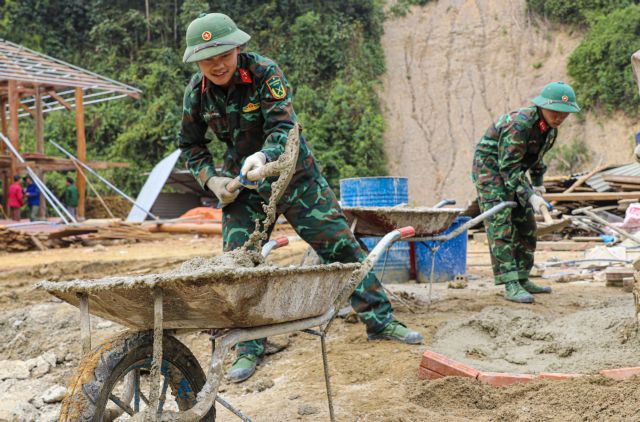 |
| Soldiers help local people of Tin Tốc Village, Mường Pôn Commune, Điện Biên District, rebuild houses after devastating floods in 2024. — VNA/VNS Photo Phan Quân |
Second, focus on building human resources, especially high-quality human resources, for the development of a streamlined, strong, modern military. The strength of a revolutionary military is the synthesis of many elements: human resources, organisation, weapons, materiel, and combat skills. Among them, human resources are a critical component, and weapons and equipment play an essential role.
Building a streamlined, strong, modern military requires focusing on the development of high-quality human resources, with a particular emphasis on the training and development of capable military personnel, especially at the strategic and operational levels that will play vanguard, example-setting role in military and defence activities.
Military schools should continue to make reforms and adapt training methods to meet the needs of building the military in the modern context. This includes modernising the educational system, integrating research, and aligning training with field practice. Units and schools must apply scientific and technological progress, integrating international cooperation into training, especially in the training of leading cadres, scientists and experts.
There is also the need for the military schools to do research on military science, to supplement and develop Vietnamese military art. In particular, focusing on researching and applying the achievements of modern military science and theory in the world to the actual conditions of the country, based on all-people national defence and people's war posture; studying and compiling a system of textbooks and documents suitable for the goals and requirements of training high-quality human resources in the new situation.
Military units must also increase night combat training, training in complex, high-intensity conditions, with practice the main focus; hold drills, training, competitions, etc. at all levels safely; improve the capacity to master weapons, equipment, especially new ones; and actively apply IT, simulation technology and other technical methods in training.
Along with education and training, agencies, units and schools need to promote the building of strict regularity and discipline in training, combat readiness, management of personnel, weapons and technical equipment; ensuring unity from will to action.
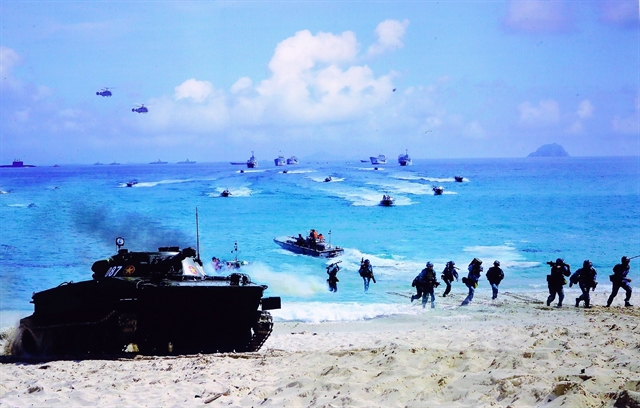 |
| Coordination training for different military branches in an island assault and target capture exercise. — Photo courtesy the Việt Nam People's Navy |
Third, accelerate the organisational restructuring of military forces and the modernisation of weaponry and equipment across all branches. Following the Party's directives, the military has focused on concerted efforts to streamline and strengthen its forces, ensuring balance between regular and reserve units and military branches. Significant investment is being made in developing a self-reliant and modern dual-use defence industry, while international cooperation is being enhanced. The military is also paying attention to research and development to produce, as well as master, a number of strategic weapons necessary for national defence and ensure a step forward in quantity and improve the quality of weapons and technical equipment.
The restructuring must consolidate new units, streamline party organisations, and integrate administrative reforms, IT applications, digital transformation, and e-government development within the Ministry of National Defence.
Efforts should also focus on enhancing mobility and modernising equipment with high quality and compatibility with the nation's economic conditions. Simultaneously, existing weapons and equipment must be well-maintained and used effectively, integrating both old and new systems for modern warfare aligned with the all-people's war strategy.
The military must secure modern weaponry, continue investing in a self-reliant, dual-use defence industry, and prioritise strategic modern weapons. Expanding international cooperation and technology transfer in defence will also remain crucial.
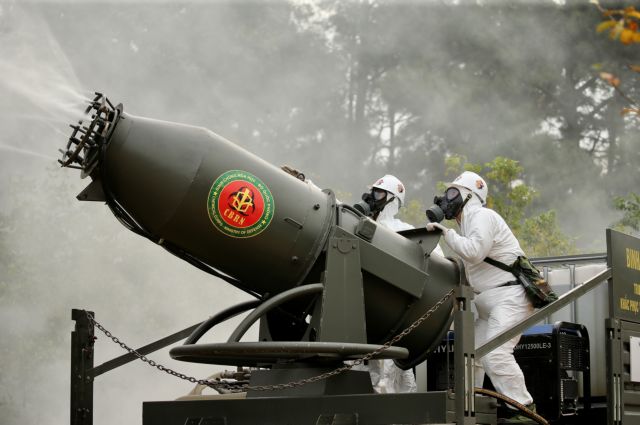 |
| A drill of a chemical unit of the Việt Nam People's Army. — VNA/VNS Photo |
Fourth, continue to leverage the strength of the entire political system and the military’s role in constructing a strong, all-encompassing national defence. Over the past 80 years, Việt Nam has combined the people’s strength with modern military capabilities, using the military as the core force for both the revolution and ongoing national defence. Moving forward, building a streamlined, modern military must remain closely tied to strengthening the military’s central role in constructing a national defence based on the people’s security, in line with the Party’s directives on safeguarding national interests in the new era.
Military agencies at all levels and defence economic groups must uphold their responsibilities, promote their core role, coordinate with departments, branches and organisations in advising local Party committees and authorities to lead and direct the combination of defence and economy; focus all resources on defence, especially the system of combat and defence infrastructure works; prioritising defence works on borderlines, seas, islands, strategic and key areas; have plans to protect the country early and from afar, not to be passive or surprised strategically.
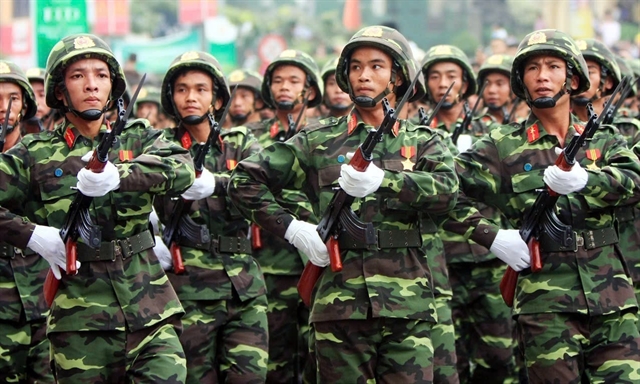 |
| Soldiers participating in the parade commemorating the 70th anniversary of the historic Điện Biên Phủ Battle Victory (May 7, 1954 - 2024). — VNA/VNS Photo Huy Hùng |
Fifth, expand and improve the effectiveness of international cooperation and defence diplomacy in the new global context. International integration and defence diplomacy are vital components of Việt Nam's foreign policy, contributing to increasing resources to build the army, consolidating national defence, meeting the requirements and tasks of the revolution in each period.
During the resistance war against the French, defence diplomacy mobilised the sympathy, support and assistance of socialist fraternal countries and international friends, contributing to building a stronger army with high mobility and strong firepower, launching large, continuous and long-term campaigns, gaining and maintaining strategic initiative, moving towards crushing the highest military effort of the French at the Điện Biên Phủ battle in 1954.
During the resistance war against the United States to save the nation, once again, defence diplomacy made an important contribution to building our army into a relatively modern, full-fledged army that joined forces with the people to defeat a superpower's professional army equipped with modern weapons that dominated on land, at sea and in the air, regaining independence and national reunification.
Today, building a strong and modern army, along with promoting internal strength, relies mainly on our own strength, but this will also require expanding and improving the effectiveness of international cooperation and defence diplomacy. Accordingly, Party committees and commanders of all armies and branches need to focus on thoroughly disseminating and educating cadres and soldiers, especially those working in foreign affairs, to firmly grasp the foreign policies and guidelines of the Party and State as defined in the Resolution of the 13th National Party Congress, the Resolution of the 11th Military Party Congress; Resolution of the 8th Party Central Committee, 13th tenure on the Strategy for National Defence in the new situation, as well as viewpoints, principles, goals, requirements, and tasks of international integration and defence diplomacy; creatively applying the "bamboo diplomacy" policy.
We must maintain sound defence cooperation relations with neighbouring countries, major countries, strategic partners, ASEAN countries, and traditional friendly countries; firmly adhere to the "four nos" defence policy (no partaking in military alliances, no siding with one country to act against another, no foreign military bases in the Vietnamese territory or using Việt Nam as leverage to counteract other countries, and no using force or threatening to use force in international relations); ensure the highest national interests based on international law; strengthen research, accurately and promptly forecast trends in international relations, especially relations between countries and organisations that directly affect Việt Nam's national interests.
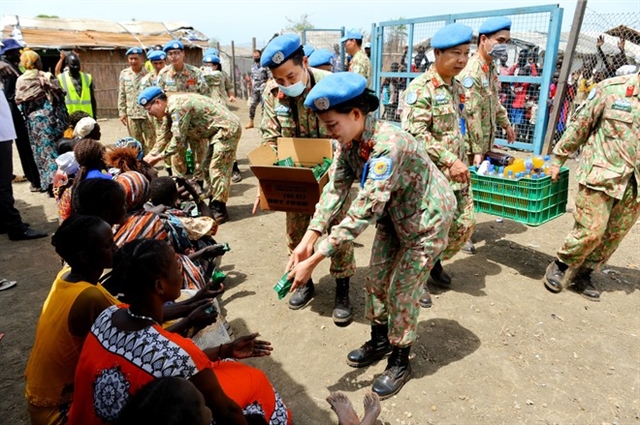 |
| In recent years, the Việt Nam People's Army has participated in United Nations peacekeeping operations, achieving significant results and contributing to enhancing Việt Nam's stature and reputation on the international arena. — VNA/VNS Photo Trọng Đức |
Under the leadership of the Party and the light of Hồ Chí Minh's Thought, promoting the heroic tradition, the entire army continues to strive to complete national defence tasks, determined to achieve the goal of basically building a streamlined, strong and modern army in 2025, contributing with the entire Party and people to bring the country into a new era - "the era of the nation on the rise", building and defending the socialist Việt Nam motherland.
*The article was edited for length